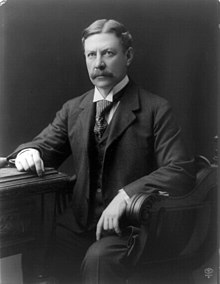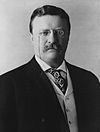William Henry Moody: Difference between revisions
m Robot - Speedily moving category United States Supreme Court justices to Category:Justices of the Supreme Court of the United States per CFDS. |
Rescuing 2 sources and tagging 0 as dead. #IABot (v1.6.1) (Balon Greyjoy) |
||
| Line 5: | Line 5: | ||
|nominator = [[Theodore Roosevelt]] |
|nominator = [[Theodore Roosevelt]] |
||
|term_start = December 12, 1906 |
|term_start = December 12, 1906 |
||
|term_end = November 20, 1910<ref name="fedjudcenter">{{cite news |title=Federal Judicial Center: William Henry Moody |date=2009-12-11 |url=http://www.fjc.gov/servlet/tGetInfo?jid=1672 |accessdate=2009-12-11}}</ref> |
|term_end = November 20, 1910<ref name="fedjudcenter">{{cite news |title=Federal Judicial Center: William Henry Moody |date=2009-12-11 |url=http://www.fjc.gov/servlet/tGetInfo?jid=1672 |accessdate=2009-12-11 |deadurl=yes |archiveurl=https://web.archive.org/web/20090513235333/http://www.fjc.gov/servlet/tGetInfo?jid=1672 |archivedate=2009-05-13 |df= }}</ref> |
||
|predecessor = [[Henry Billings Brown|Henry Brown]] |
|predecessor = [[Henry Billings Brown|Henry Brown]] |
||
|successor = [[Joseph Rucker Lamar|Joseph Lamar]] |
|successor = [[Joseph Rucker Lamar|Joseph Lamar]] |
||
| Line 42: | Line 42: | ||
Moody's service on the Court was brief but not uneventful, writing 67 opinions and 5 dissents. His most noted opinion was in the minority in ''Employers Liability Cases'' (1908), where he held that Congress' power to regulate interstate commerce included the ability to legislate management's relationship with employees. While he generally supported enhanced federal powers, opinions as ''[[Twining v. New Jersey]]'' (1908), where he held that the [[Fifth Amendment to the United States Constitution|Fifth Amendment's]] protection against compulsory self-incrimination did not apply to cases presented in [[State court (United States)|state courts]], made him hard to pigeonhole. He also wrote for a unanimous court in the famous case of ''[[Louisville & Nashville Railroad Co. v. Mottley]]'', which limited [[federal question jurisdiction]] to cases in which the [[plaintiff]]'s [[cause of action]] was based on federal law. |
Moody's service on the Court was brief but not uneventful, writing 67 opinions and 5 dissents. His most noted opinion was in the minority in ''Employers Liability Cases'' (1908), where he held that Congress' power to regulate interstate commerce included the ability to legislate management's relationship with employees. While he generally supported enhanced federal powers, opinions as ''[[Twining v. New Jersey]]'' (1908), where he held that the [[Fifth Amendment to the United States Constitution|Fifth Amendment's]] protection against compulsory self-incrimination did not apply to cases presented in [[State court (United States)|state courts]], made him hard to pigeonhole. He also wrote for a unanimous court in the famous case of ''[[Louisville & Nashville Railroad Co. v. Mottley]]'', which limited [[federal question jurisdiction]] to cases in which the [[plaintiff]]'s [[cause of action]] was based on federal law. |
||
By 1908, Moody suffered severe [[rheumatism]]. This affected Moody to such an extent that his last sitting on the bench was May 7, 1909, when he left for a brief rest and never returned. With the age- and health-enfeebled Supreme Court of 1909 crippled (President [[William Howard Taft]] was to make a record-setting 5 appointments due to death and resignations over a course of a single year in 1910–1911), Taft urged Moody, then the youngest justice at 55, to step down. After Taft successfully lobbied Congress for a Special Act to grant Moody retirement benefits not normally granted unless justices reached age 70 or 10 years of service (enacted June 23, 1910), Moody retired from the Court on November 20, 1910.<ref>[http://www.supremecourthistory.org/04_library/subs_volumes/04_c17_f.html The Supreme Court Historical Society<!-- bot-generated title -->] at www.supremecourthistory.org</ref> He died in [[Haverhill, Massachusetts]], July 2, 1917. |
By 1908, Moody suffered severe [[rheumatism]]. This affected Moody to such an extent that his last sitting on the bench was May 7, 1909, when he left for a brief rest and never returned. With the age- and health-enfeebled Supreme Court of 1909 crippled (President [[William Howard Taft]] was to make a record-setting 5 appointments due to death and resignations over a course of a single year in 1910–1911), Taft urged Moody, then the youngest justice at 55, to step down. After Taft successfully lobbied Congress for a Special Act to grant Moody retirement benefits not normally granted unless justices reached age 70 or 10 years of service (enacted June 23, 1910), Moody retired from the Court on November 20, 1910.<ref>[http://www.supremecourthistory.org/04_library/subs_volumes/04_c17_f.html The Supreme Court Historical Society<!-- bot-generated title -->] {{webarchive|url=https://web.archive.org/web/20050903031731/http://www.supremecourthistory.org/04_library/subs_volumes/04_c17_f.html |date=2005-09-03 }} at www.supremecourthistory.org</ref> He died in [[Haverhill, Massachusetts]], July 2, 1917. |
||
After Moody's death, some of his official papers were placed in the custody of Professor [[Felix Frankfurter]], then of [[Harvard Law School]]. They are now in the collection of Frankfurter's papers in the Manuscript Division of the [[Library of Congress]]. |
After Moody's death, some of his official papers were placed in the custody of Professor [[Felix Frankfurter]], then of [[Harvard Law School]]. They are now in the collection of Frankfurter's papers in the Manuscript Division of the [[Library of Congress]]. |
||
Revision as of 22:33, 15 December 2017
William Henry Moody | |
|---|---|
 | |
| Associate Justice of the Supreme Court of the United States | |
| In office December 12, 1906 – November 20, 1910[1] | |
| Nominated by | Theodore Roosevelt |
| Preceded by | Henry Brown |
| Succeeded by | Joseph Lamar |
| United States Attorney General | |
| In office July 1, 1904 – December 12, 1906 | |
| President | Theodore Roosevelt |
| Preceded by | Philander Knox |
| Succeeded by | Charles Bonaparte |
| United States Secretary of the Navy | |
| In office May 1, 1902 – June 30, 1904 | |
| President | Theodore Roosevelt |
| Preceded by | John Davis Long |
| Succeeded by | Paul Morton |
| Member of the U.S. House of Representatives from Massachusetts's 6th district | |
| In office November 5, 1895 – May 1, 1902 | |
| Preceded by | William Cogswell |
| Succeeded by | Augustus Peabody Gardner |
| Personal details | |
| Born | December 23, 1853 Newbury, Massachusetts, U.S. |
| Died | July 2, 1917 (aged 63) Haverhill, Massachusetts, U.S. |
| Political party | Republican |
| Education | Harvard University (BA) |
William Henry Moody (December 23, 1853 – July 2, 1917) was an American politician and jurist, who held positions in all three branches of the Government of the United States.
Biography
Born a son of farmers in Newbury, Massachusetts, Moody graduated from Phillips Academy in 1872 and from Harvard, Phi Beta Kappa in 1876,[2] where he was a classmate and friend of future President Theodore Roosevelt. After 4 months attending Harvard Law School, he departed and instead took the then-common but now-unusual step of reading law (under Richard Henry Dana, Jr.) to pass the bar.
Early in his legal career, Moody first was elected city solicitor of Haverhill, Massachusetts in 1888. After appointment as the District Attorney for Eastern Massachusetts in 1890, he gained widespread notoriety in 1893 as the junior prosecutor in the Lizzie Borden murder case. While his efforts were unsuccessful he was generally acknowledged as the most competent and effective of the attorneys on either side. He was elected to the U.S. House of Representatives from Massachusetts, and served from 1895 until 1902 where he served on the powerful Appropriations Committee. During President Theodore Roosevelt's administration, Moody served as the Secretary of Navy (1902–1904) and as Attorney General (1904–1906). As Attorney General, Moody actively followed Roosevelt's trust-busting policies, negotiating with 'good' trusts like U.S. Steel but prosecuting 'bad' ones like Standard Oil. After failing to convince William Howard Taft to take the seat, on December 12, 1906, Roosevelt nominated Moody as an Associate Justice of the U.S. Supreme Court and Moody was confirmed December 12, 1906.[3]
Moody's service on the Court was brief but not uneventful, writing 67 opinions and 5 dissents. His most noted opinion was in the minority in Employers Liability Cases (1908), where he held that Congress' power to regulate interstate commerce included the ability to legislate management's relationship with employees. While he generally supported enhanced federal powers, opinions as Twining v. New Jersey (1908), where he held that the Fifth Amendment's protection against compulsory self-incrimination did not apply to cases presented in state courts, made him hard to pigeonhole. He also wrote for a unanimous court in the famous case of Louisville & Nashville Railroad Co. v. Mottley, which limited federal question jurisdiction to cases in which the plaintiff's cause of action was based on federal law.
By 1908, Moody suffered severe rheumatism. This affected Moody to such an extent that his last sitting on the bench was May 7, 1909, when he left for a brief rest and never returned. With the age- and health-enfeebled Supreme Court of 1909 crippled (President William Howard Taft was to make a record-setting 5 appointments due to death and resignations over a course of a single year in 1910–1911), Taft urged Moody, then the youngest justice at 55, to step down. After Taft successfully lobbied Congress for a Special Act to grant Moody retirement benefits not normally granted unless justices reached age 70 or 10 years of service (enacted June 23, 1910), Moody retired from the Court on November 20, 1910.[4] He died in Haverhill, Massachusetts, July 2, 1917.
After Moody's death, some of his official papers were placed in the custody of Professor Felix Frankfurter, then of Harvard Law School. They are now in the collection of Frankfurter's papers in the Manuscript Division of the Library of Congress. Moody's office furnishings and papers were actually donated to the Haverhill Historical Society and there is a Moody Room open to the public at the Buttonwoods Museum in Haverhill that features his personal collection. www.buttonwoods.org
Legacy
USS Moody (DD-277) was named for him.
Notes
- ^ "Federal Judicial Center: William Henry Moody". 2009-12-11. Archived from the original on 2009-05-13. Retrieved 2009-12-11.
{{cite news}}: Unknown parameter|deadurl=ignored (|url-status=suggested) (help) - ^ Supreme Court Justices Who Are Phi Beta Kappa Members, Phi Beta Kappa website, accessed Oct 4, 2009
- ^ HarpWeek: Cartoon of the Day at www.harpweek.com
- ^ The Supreme Court Historical Society Archived 2005-09-03 at the Wayback Machine at www.supremecourthistory.org
References
- Lewis L. Gould. "Moody, William Henry"; American National Biography Online February 2000.
- James F. Watts, Jr., "William Moody," in The Justices of the United States Supreme Court 1789-1969, ed. Leon Friedman and Fred L. Israel (1969),
Sources and external links
- United States Congress. "William Henry Moody (id: M000883)". Biographical Directory of the United States Congress.
 This article incorporates public domain material from the Biographical Directory of the United States Congress
This article incorporates public domain material from the Biographical Directory of the United States Congress This article incorporates text from the public domain Dictionary of American Naval Fighting Ships.
This article incorporates text from the public domain Dictionary of American Naval Fighting Ships.
Template:Start U.S. Supreme Court composition Template:U.S. Supreme Court composition court lifespan Template:U.S. Supreme Court composition 1906–1909 Template:U.S. Supreme Court composition January–March 1910 Template:U.S. Supreme Court composition March–July 1910 Template:U.S. Supreme Court composition CJ Template:U.S. Supreme Court composition court lifespan Template:U.S. Supreme Court composition 1910 Template:End U.S. Supreme Court composition
- 1853 births
- 1917 deaths
- 19th-century American politicians
- 20th-century American judges
- 20th-century American politicians
- Harvard University alumni
- Massachusetts lawyers
- Massachusetts Republicans
- Members of the United States House of Representatives from Massachusetts
- Phi Beta Kappa members
- Phillips Academy alumni
- Republican Party members of the United States House of Representatives
- Theodore Roosevelt administration cabinet members
- United States Attorneys General
- United States federal judges appointed by Theodore Roosevelt
- United States Secretaries of the Navy
- Justices of the Supreme Court of the United States
- United States federal judges admitted to the practice of law by reading law








